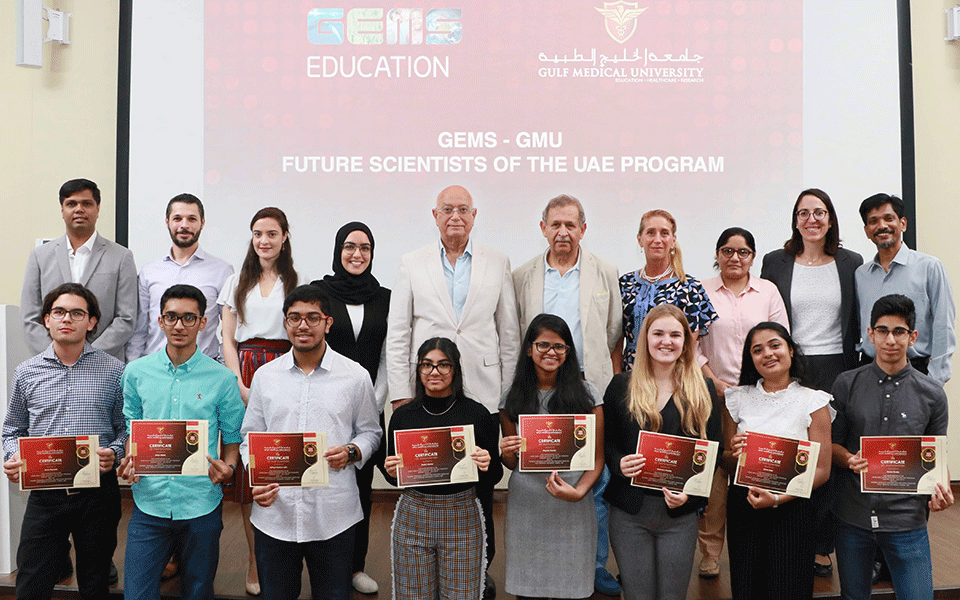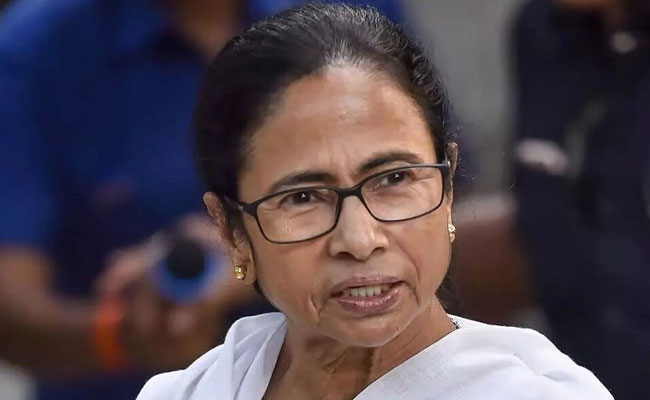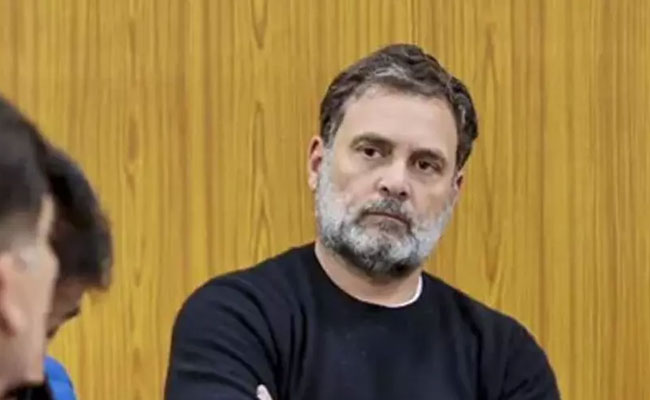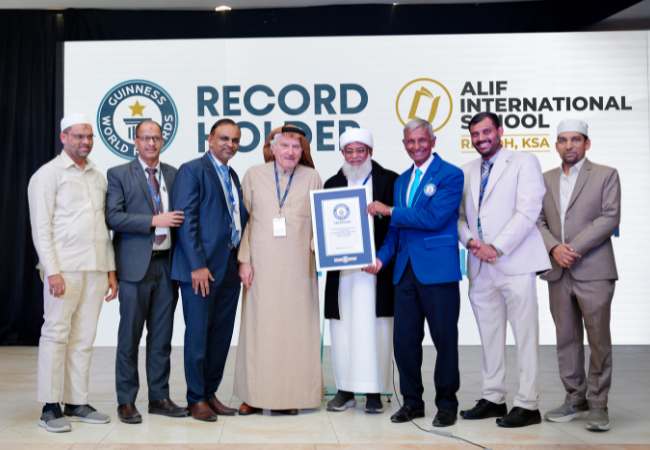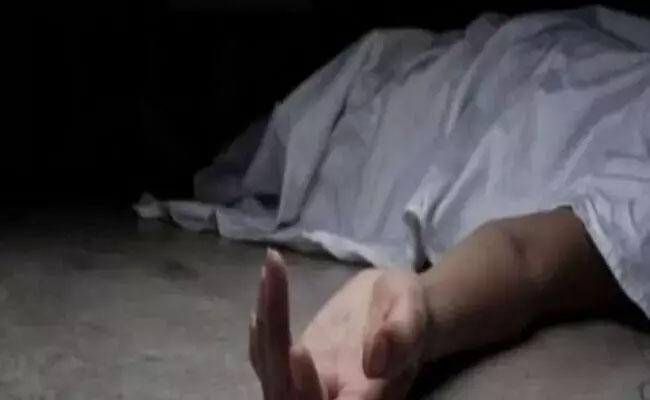Ajman, UAE: Students of the first batch of the ‘Future Scientists of the UAE’ initiative launched by Gulf Medical University (GMU) last year, in collaboration with GEMS International Schools successfully completed their research internship at the University and were awarded certificates on 15th June 2019.
The initiative was launched in January 2018, in line with the strategic initiatives for the Emirates Scientists Council launched by the Vice President and Prime Minster of the UAE and Ruler of Dubai His Highness Sheikh Mohammed bin Rashid Al Maktoum, with the aim of creating a conducive environment for innovation and scientific research in the country.
Addressing the gathering of students, faculty members and parents at the certificate distribution ceremony, Prof. Hossam Hamdy, the Chancellor of GMU said that the ‘Future Scientists of the UAE’ program had been launched with the aim of providing research exposure to school students, so that they become inquisitive and innovative early on in their student lives. “Usually research is introduced very late during the learning process. However, learning takes place through research and socialization, and it is important to embed the learner in the environment at the earliest possible stage,” he explained, adding, “Today marks the completion of the first batch of this program. There will be subsequent batches.”
Prof. Salem Chouaib, Vice Chancellor, Research, GMU said, “One of the important missions of GMU is to help the students discover the world of research and help them become people generating knowledge, rather than mere knowledge consumers.”
The students of the first batch had been selected from grades 9 to 12 from various schools under GEMS, through a competitive admission process. The future scientists were mentored by research scientists, professors and clinical staff at Gulf Medical University. Faculty mentors also encouraged thinking outside of the box: students first learned the concept of developing a research question, followed by the selection and conducting of the necessary experiments to answer their question of interest and finally, interpreting and presenting the results in relation to the research objective. GMU’s world-class research facility, The Thumbay Research Institute for Precision Medicine - played a central role in the program.
Recounting her experience attending the program, one of the participant students, Rosemary Woolley said, “This program has helped me realize the importance of research in the scientific community. It has made me excited for future discoveries in cancer research. I’ve enjoyed my time at GMU and I hope that someday I would be able to play a role in the research community. I’m grateful for the opportunity that I’ve had and I hope to contribute constructively in future research programs.”
Another participant, Adithya Mathew explained how the program enriched his thirst for knowledge and research: “I was only looking into a career in science, before enrolling in this program. This program has given me valuable theoretical and practical knowledge that is not only helping me in school, but will also help me in the future. My love for science and research has increased tenfold; thanks to this program. I cannot express how grateful I am, for this learning experience.”
Varsha Bijali, a participant, said that the program gave her the opportunity to work alongside the nation’s leading professors of biochemistry and cancer-cell biology. This gave me the perfect opportunity to understand the field of medicine beyond the academic curriculum. I’ll be taking the knowledge I gained from this program when I start medical university this September,” she said.
Ahsan Nayaz was another participant who shared a similar experience. “We learned a lot more than we usually learn at school, at a pace that never became a burden on us. We got hands-on experience and exposure to the research world, but overall we had fun, interacting with each other and with the professors, gaining new knowledge in the process. I feel proud and privileged to be a part of this program. I will be taking the knowledge gained here, towards my future medical endeavors,” he said.
Dr. Kierstan Connors, Associate Director of GEMS College & Career Counseling Worldwide said that the program was a one-of-its-kind opportunity for high school students, to get involved in hands-on research, in the company of highly-experienced faculty members. “For our students, this has been a lifetime experience of research, learning and curiosity. It was 16 students from GEMS who committed to the first batch. I now get about 10 student/parent requests a week, to ask about the next batch of the program,” she said, commenting on the rising popularity and effectiveness of the program. The second batch of ‘Future Scientists of the UAE’ is scheduled to begin from September 2019.
Let the Truth be known. If you read VB and like VB, please be a VB Supporter and Help us deliver the Truth to one and all.
New Delhi (PTI): West Bengal Chief Minister Mamata Banerjee has filed a petition in the Supreme Court against the ongoing Special Intensive Revision (SIR) of the electoral rolls in the state, sources said on Sunday.
The petition names the Election Commission (EC) and the chief electoral officer of West Bengal as respondents. It was filed before the apex court on January 28, the sources said.
Banerjee arrived in Delhi on Sunday. She is scheduled to meet Chief Election Commissioner (CEC) Gyanesh Kumar at 4 pm on Monday to discuss the ongoing SIR exercise in West Bengal. The Trinamool Congress (TMC) supremo would be accompanied by a delegation of party leaders.
She is also likely to meet party MPs in the Parliament House on Monday.
Talking to reporters at the Kolkata airport before leaving for the national capital, Banerjee claimed that the ruling Bharatiya Janata Party (BJP) at the Centre is resorting to the SIR exercise because it is certain of its imminent defeat in the West Bengal Assembly polls, due in a few months, and said the saffron party should contest the election politically and democratically.
The West Bengal chief minister has written several letters to the CEC, raising concerns over the conduct of the exercise.
In her most recent letter to the CEC on January 31, she alleged that the methodology and approach of the exercise went beyond the provisions of the Representation of the People Act and the relevant rules, causing "immense inconvenience and agony" to citizens.
Earlier, TMC leaders, including Rajya Sabha MPs Derek O'Brien and Dola Sen, had moved the apex court, challenging certain aspects of how the SIR is being carried out in West Bengal.

